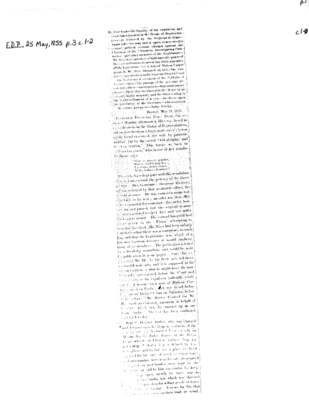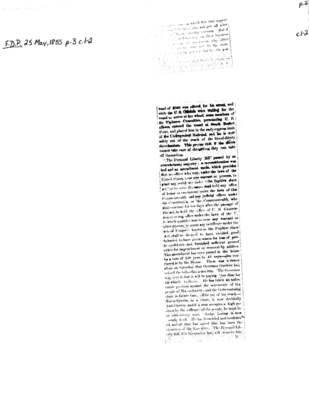Pages
D6790_Page_1
BOSTON, May 21, 1855.
FREDERICK DOUGLASS, ESQ.: DEAR SIR:— On last monday afternoon a Hiss was heard in one of the nests in the House of Representatives, and on investigation a large male goose (?) was quietly found ensconced, not only by patriotic members, but by the sacred "bill of rights" and the "Constitution." This carries us back to "old mother goose," who is one of her inimitable rhymes says
"Goo-se, goo-se gander, Where shall I find her; Up stairs, down stairs, In the ladies' chamber."
Those who have kept pace with this scandalous affair, will understand the potency of the above question. But, to resume: the goose Hiss(ed,) and was removed by that invaluable officer, the sergeant-at-arms. He was soon seen again toddling back to his nest; and order was then offered for committal for contempt; this order, however, was not passed, but the sergeat-at-arms was again ordered to eject him and not suffer him again to return. His counsel has published a long article in the "Times," attempting to show that his client (Mr. Hiss) had been unfairly dealt with—that there was a conspiracy to crush him, and that the Legislature was afraid of a fair investigation because it would implicate many of its members. The publication referred to, is decidedly scurrillous, and would be unfit for publication in your paper. Since the expulsion of Mr. Hiss he has been arrested twice on two different suits, and it is supposed at his own instigation, so that he might have the matter legally investigated before the Court and the illegality of the expulsion judicially established. A hearing on a write of Habeas Corpus granted on Friday, and was heard before the Supreme District Court on Saturday, before Judge Shaw. Mr. Butler, Counsel for Mr. Hiss, made an elaborate argument in behalf of his client, which may be summed up in one word, "fudge." The case has been continued over till Tuesday.
Wm. C. Deming, barber, who was charged with keeping open his shop in violation of the Sunday laws, was discharged from custody on Wednesday by Judge Rogers of the Police Court, who decided that a "barber's shop" was not a shop, (?) that a shop as defined by lexicographers, and by law, was a place or building used for the sale of goods, or where wares and merchandize were kept for sale; as no proof that goods or merchandise were kept by the defendant, or sold by him on Sunday, his keeping his shop open merely to shave, was no breach of the Sunday law, which was directed to keeping open shop for selling goods, or wares, and not against shaving. You see by this, that the barbers may carry on their trade as usual; we can imagine cases in which this may appear very convenient to those who will put off what they may well do on Saturday evening. But if barbers are allowed to carry on their business on Sunday, we can see no reason why other mechanics or laborers may not do the same. "What is far for the goose is fair for the gander."
A fugitive slave escaped from Virginia on board of a vessel bound to this port. A re-
D6790_Page_2
ward of $500 was offered for his arrest, and while the U.S. Officials were waiting for the vessel to arrive at her wharf, some members of the Vigilance Committee, personating U. S. officers, entered the vessel at South Boston Point, and placed him in the early express train of the Underground Railroad, and he is now safely out of the reach of the blood-thirsty slave-hunters. This proves that if the slaves cannot take care of themselves, they can take off themselves.
"The Personal Liberty Bill" passed by an overwhelming majority; a re-consideration was had and an amendment made, which provides that no officer who may, under the laws of the United States, issue any warrant or process, to grant any certificate under "the fugitive slave act," or to serve the same, shall hold any office of honor or emolument under the laws of this Commonwealth, and any judicial officer under the Constitution, or the Commonwealth, who shall continue for ten days, after the passage of this act, to hold the office of U. S. Commissioner, or any office under the laws of the U. S. which qualifies him to issue any warrant or other process, to grant any certificate under the acts of Congress known as the Fugitive Slave Act, shall be deemed to have violated good behavior, to have given reason for loss of public confidence, and furnished sufficient ground either for impeachment or removal by address, This amendment has been passed in the house by a vote of 230 years, to 43 nays—also concurred in by the House. There was a rumor afloat on Saturday, that Governoer Gardner had vetoed the bill—this is not true. The Governor may veto it, but it will be paying "too dear for his whistle," to do so. He has taken an unfotunate position against the sentiments of the people of Massachusetts, and the Gubernatorial chair, in future time, will be out of his reach.— Massachusetts, as a State, is now decidedly Anti-Slavery, and if a man occupies a high position by the suffrages of the people, he must e an anti-slavery man. Judge Loring is now morally dead. He has been tried and condemned, and all that has saved him has been the clemency of the Executive. The Personal Liberty Bill, if it becomes a law, will remove him.
S.

